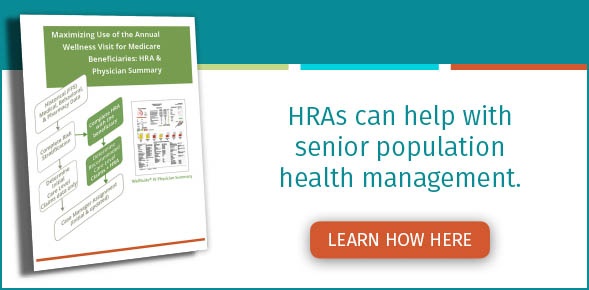Anyone getting results from a medical assessment or test might be nervous—regardless of their age. Seniors are no exception. Fewer than 1 in 5 take advantage of their annual wellness visit (AWV) benefit, which includes a health risk assessment (HRA). Administering the Medicare HRA prior to the AWV is one way population health professionals help reduce some of the anxiety.

The Medicare HRA is the first step on the road to better health. It gathers self-reported information that serves as an early awareness tool for both seniors and providers. Questions follow the CDC Framework and CMS recommendations including psychosocial, behavioral, and daily living factors. The personal report generated by the HRA gives seniors a peek into their health status and risks in a positive, non-threatening format and provides action steps to help them improve. The physician summary displays all the individual’s responses on one-page, making it easier for population health managers and clinicians to develop a plan of action for each person and to match seniors with programs most relevant for their individual health needs.
An HRA can be a non-threatening way to collect health information and encourage healthy behaviors while also serving as a time-saver for health professionals to target the individual’s behaviors and other health needs. Distributing the HRA prior to the AWV can relieve some of the pressure seniors might feel by allowing them the convenience of answering the questions in a comfortable setting and at their own timing.
HRA Results Can Answer Questions and Address Misconceptions
Some seniors may be afraid of aging because of anecdotes they have heard from others about increased risk of falls and memory loss. They fear losing independence or incurring huge medical costs. Their anxiety about completing the HRA and attending the wellness visit is tied to the fear of finding something life-changing or an issue that limits freedom, the shame of revealing something negative, feeling uncomfortable with doctors, among others. And yet, HRAs can be extremely effective for flagging problems and potential conditions early on, especially if the person has a condition that they might not have been appropriately screened for elsewhere.
It’s important to keep in mind that most people getting their first Medicare HRA might be unaware of the benefit of addressing symptoms and illnesses before they develop. That’s why population health professionals must explain the role of HRAs in preventive medicine.
For example, seniors might not be aware of the preventive tests and vaccines they should be getting—or when. HRAs increase awareness by providing a recap of a recommended screening schedule for the next five to ten years, reducing confusion and increasing the chances that the senior follows through on setting up the appointments. HRA results can clarify which next steps are time-sensitive and can reduce anxiety around those not in the immediate future.
HRAs Can Be a Non-Threatening Tool that Reduces Health Anxiety
Many Medicare HRAs are completed online, or on a tablet, or paper, sometimes with the assistance of a caregiver or caseworker. This makes it easier for seniors to complete the assessment at their convenience any time prior to their appointment so doctors and clinicians have current relevant data when meeting with patients.
When someone filling out the Medicare HRA knows that it can be used to get individualized feedback from a physician as part of the annual wellness visit, they are less likely to be concerned about sharing some of their personal data.
And when the HRA results are translated into reports, this data should be shared with the taker alongside health education tips, referrals to specific services, and action-oriented information based on the outcomes.
This brings us to our next point.
HRAs Provide Meaningful Data and Next Steps
The Medicare HRA is filled with data that helps individuals make healthier choices even without the AWV. Population health professionals can use the data to connect seniors with useful services, such as nutrition counseling or in-home care. The HRA is even more useful when a healthcare professional reviews the lifestyle choices and behaviors that can be adopted to improve existing health conditions and symptoms and increase day-to-day functioning as part of the AWV.
Unlike many traditional approaches in medicine, the Medicare HRA is designed to equip the person completing it with information and education to play an active role in defining their own future health. This can encourage timely decision-making and promote self-reliance among the population completing their Medicare HRA.
To accomplish this, population health and wellness professionals involved in the collection and review of individual Medicare HRA reports should be prepared to present the outcomes to the senior in a format that empowers them with confidence in their individual health management choices and behaviors. The senior should be actively engaged in the review of their outcomes with a forward-focused analysis of healthy habits that will improve their overall quality of life.
Want to learn more about Medicare HRAs and how they can help seniors live well? Click the button below and learn everything you need to know!








